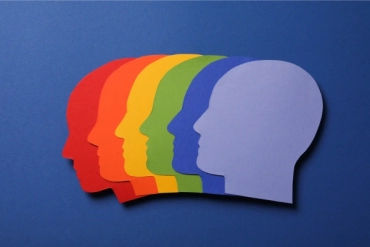Did you know that at least 400 new cases of people with Autism Spectrum Disorder (ASD) are diagnosed annually in Singapore?
We didn’t either – until we came across these statistics reported by the National University Health System.
Curious to find out more? ONE has got your back.

As part of Developmental Disabilities Month, we’re releasing a series of articles about the various types of developmental disabilities. And today, this article will focus on autism. We’re going to break it down for you into a short, easy-to-read guide, covering:
- What is autism?
- What are its causes and symptoms?
- What are some communities to support people with autism?
Ready? Let’s dive in!!
What Is Autism?
Autism is a neurodevelopmental condition that affects how individuals perceive the world and with others.
People with autism experience the world differently — they may be more sensitive to certain lights, sounds, or textures and may also find social interaction and communication more challenging. Social cues that come naturally to others — like making eye contact or maintaining a conversation — may require extra effort for them.
💡 Fun fact: Did you know that autism in Chinese is 自闭症 – which literally translates to “self-closed illness”? That’s a huge misnomer! While individuals with autism may find social skills challenging, they are by no means incapable of communication or empathy.
Additionally, autism exists on a spectrum. This means no two individuals with autism are the same. Each person has different levels of language, social, and motor skills. Which explains why the infinity symbol with a rainbow is used for autism awareness—to represent the diverse experiences of neurodivergent individuals.

Causes and Symptoms of People With Autism
Causes of Autism
There is no single known cause of autism, contrary to what some naysayers might insist.
Let’s clear up some common misconceptions once and for all:
🚫 Autism is NOT caused by:
- Vaccines
- Bad parenting
- Anything done by the mother before, after or during pregnancy

In fact, autism is influenced by a combination of genetic and environmental factors. Research suggests certain risk factors, but it’s important to note that not all children exposed to these factors will develop autism:
- Maternal diabetes
- Exposure to air pollution in the womb
- Advanced parental age
For a deeper dive, Autism Resource Centre Singapore has an excellent article debunking common myths about autism.
Symptoms of Autism
Autism is typically characterised by:
- Unusual sensitivity to lights, sounds and textures
- Difficulty in social interaction
- Restricted, repetitive behaviours or interests
This is just a brief introduction to the symptoms of autism – for a more in-depth review, check out Mayo Clinic’s handy guide!
In the meantime, let’s break these down further:
1. People With Autism Have Sensory Sensitivity Issues

Individuals with autism may experience hypersensitivity (over-sensitivity) or hyposensitivity (under-sensitivity) to certain stimuli.
For example, they may find:
- Bright lights, loud noises, or certain textures overwhelming
- Crowded places mentally and physically exhausting
- Some tastes or smells unbearable
💡 Fun fact: Did you know that hyposensitivity can also manifest in different ways? This includes:
👀 Visual hyposensitivity – Difficulty with depth perception or distinguishing objects with low contrast.
👂 Auditory hyposensitivity – Being less sensitive to sounds or requiring louder stimuli to notice them.
2. People With Autism Have Difficulty in Social Interaction
People with autism may struggle with social communication, often appearing as if they are “in their own world.” This is not due to a lack of interest, but rather a different way of processing social cues.
- They may avoid eye contact or use a flat or singsong tone while speaking.
- They might misinterpret facial expressions and body language.
Their approach to social interactions may vary—some may be overly passive, while others may be direct or assertive.
Important Reminder: People with autism experience emotions and empathy in unique ways. Some may struggle to express their emotions, while others may feel emotions so intensely that another person’s distress can even cause them physical discomfort.
3. People With Autism Have Restricted, Repetitive Behaviours or Interests
Repetitive Behaviours
For some individuals with autism, repetitive behaviors provide comfort and stability.
Examples of repetitive behaviours — also called stimming — include:
- Hand-flapping
- Rocking back and forth
- Head-banging
Stimming helps individuals with autism deal with stress and anxiety, and block out uncertainty.

Special Interests
Many individuals with autism develop deep, focused interests in specific subjects, sometimes to the point of obsession. These special interests can range from collecting objects to art, music, or science. In fact, many people with autism go on to turn their passions into careers!
Love for Structure
Predictability is key. Fixed routines, visual schedules, and clear structures help individuals with autism feel more in control of their environment. This is why structured teaching methods like the TEACCH approach are so effective – click to find out more about TEACCH!
Where Can I Find Communities To Support People With Autism?
We’re glad you asked! Of course, ONE Intervention Center’s very own Resource page is a great place to start. We’ve compiled a few articles about autism to get you started:
🔗 Taming Tantrums: Understanding Meltdowns and Managing Triggers – the difference between a meltdown and a tantrum for a child with autism, and how to manage both
🔗Art Therapy: Unlocking Creativity and Expression for Autistic Children – how art therapy can help children with autism
🔗 Early Signs You Shouldn’t Miss: A Guide to Autism in Young Children – possible signs of autism in young children.

Beyond just ONE, there are so many other communities that can help you or your loved one.
Check out Singapore’s Autism Resource Center for a comprehensive list of resources, including articles on autism and services that Singapore to support people with autism.
Autism Links is also a useful newsletter run by Autism Association Singapore that provides updates about AA and their school – Eden School.
And for even more, St Andrew’s Adult Home is the place to go! They’re Singapore’s first residential home built for people with autism and feature news, stories and events for people with autism!
Final Thoughts
Don’t forget, Developmental Disability Month isn’t over yet! Let us know in the comments how you’re celebrating it. Or, if you have a story to share about autism? We’re all ears. Drop us a comment below! — we’d love to hear from you! 👇👇👇

5 Comments
Comments are closed.